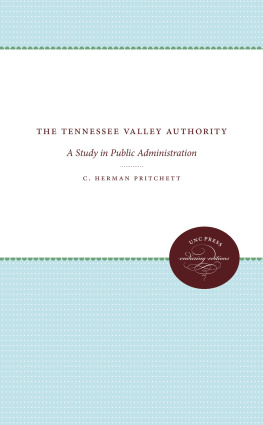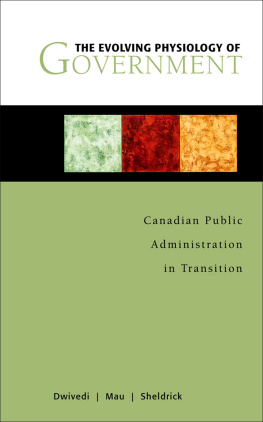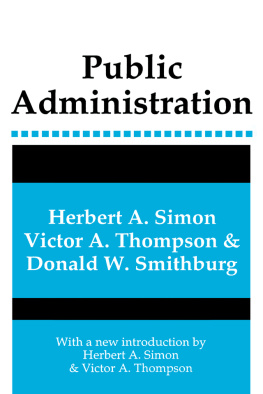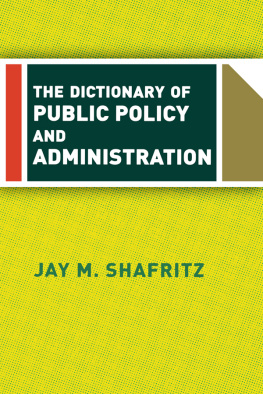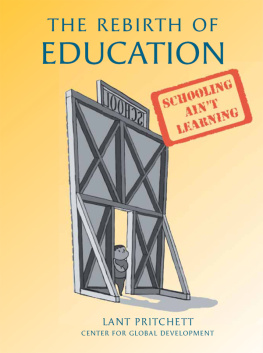Preface
Any person who undertakes to write about the Tennessee Valley Authority is in the position of the fabled blind man before an elephant. Although it is a single government institution, and only in its tenth year, the activities of the T.V.A. have been so diverse, its implications so far-reaching, its methods so novel, and its goals so challenging, that the task of appraisal and description is one of large proportions. The present study attempts only such part of that task as is within the authors grasp. His approach to the T.V.A. is primarily that of a student of public administration who finds concentrated in this public agency more of valuable administrative history and experience than has accumulated during the longer lives of dozens of more prosaic government departments and bureaus. The purpose of this book is, so far as may be possible within a reasonable compass, to tell that history and analyze that experience.
This concentration upon the administrative aspects of the T.V.A. does not mean that the author has no concern for the purposes of the Authoritys program or the social and economic effects of its activities. Indeed, the limits of the study have been purposely, and of necessity, drawn to include some consideration of these matters, for to an unusual degree the T.V.A. has sought to develop methods of administration suited to its larger purposes. To understand T.V.A. administration it is necessary to understand the T.V.A. program, and a section of this book is devoted to each of those subjects. It has not, however, been possible to attempt any real appraisal of the effect of the Authoritys program upon the economic and social life of the Tennessee Valley, a subject which would require another book for adequate consideration. The best description of what the T.V.A. has meant in terms of effect upon people and ways of life is found in the excellent volume by Willson Whitman entitled Gods Valley, published in 1939. The present author recommends that book as a supplement, or perhaps as an antidote, to this work.
Limitation of this study largely to the administrative features of the T.V.A. experience calls for no apology. In the midst of a world struggle whose outcome will be determined in large part by relative efficiency of the various governments in organization and utilization of their resources, the vital importance of effective public administration becomes too obvious to need underlining. Thirty years ago Brooks Adams said: It is in dealing with administration, as I apprehend, that civilizations have usually, though not always, broken down, for it has been on administrative difficulties that revolutions have for the most part supervened. Naturally a study of T.V.A. administration is not going to reveal how to win the war or stop civilizations from crumbling. But the contribution of the T.V.A. to the developing art of public administration is by no means an inconsiderable one, and it deserves the closest attention of thoughtful citizens who realize that an honest, enlightened, and imaginative public service is under modern conditions essential to national existence.
It would be disingenuous for the author to pretend that he has no biases in connection with the T.V.A. The example set by Vernon Parrington in frankly confessing that his great Main Currents in American Thought was written from the standpoint of a Jeffersonian liberal is a good one. The present author readily admits to a bias in favor of the T.V.A. and what it has done. He does not consider that one need be a disciple of Karl Marx or even of Norman Thomas to hold that the natural resources of our great rivers should be developed by and in the interests of the people. He does not feel that government ownership and operation of public utilities is a death blow to the profit system. He feels that the world-wide trend toward statism, which has been greatly accelerated by the necessities of the present world catastrophe, must be resisted and kept within definite limits in the United States if we are to remain a free and democratic nation. But in his judgment public operation of power monopolies falls well within those limits, and he is quite willing to compare the democracy of the T.V.A. with that of the Commonwealth & Southern Corporation.
In the preparation of this study the author has had the invaluable advice and encouragement of his chief, Leonard D. White, chairman of the administrative committee of the Political Science Department at the University of Chicago, for which he wishes to express the deepest appreciation. An earlier study of the T.V.A. was prepared by the author as a doctoral dissertation under the supervision of Marshall E. Dimock, formerly associate professor of political science at the University of Chicago, later Second Assistant Secretary of Labor, and now with the War Shipping Administration. The authors obligations to Marshall Dimock are many. He is also indebted to Charles E. Merriam for years of encouragement and guidance, and it was in a Merriam seminar that the authors interest in government corporations first took form.
The author wishes especially to acknowledge the assistance he has received from Gordon R. Clapp, general manager of the T.V.A., and from many other officials and employees of the Authority, past and present, of which the following is only a partial list: Frank J. Carr, Paul Ager, Edwin Lamke, Paul David, Glenn Smith, George Gant, Arthur S. Jandrey, Richard Niehoff, Carl Richey, Milton V. Smith, Thomas Hall, E. B. Shultz, C. H. Garity, C. W. Farrier, William J. Hayes, E. G. Wiesehuegel, Lee S. Greene, Clifford J. Hynning, Kenneth V. James, Lawrence L. Durisch, T. L. Howard, and Misses Alice Dewar, Laverne Burchfield, and Mary Agnes Gordon. The excellent bibliographies prepared by Harry Bauer and Miss Alice M. Norwood of the T.V.A. Technical Library have been of great assistance. The Technical Library staff, particularly Ernest I. Miller and Bernard Foy, were very helpful. W. L. Sturdevant, T.V.A. director of information, very kindly supplied data requested. Diagrams in the book are used by courtesy of the T.V.A.
The final chapter of this book has appeared in substantially the same form as an article in The Virginia Quarterly Review. Material in several other chapters has been taken from articles by the author published in Social Forces, Public Administration Review, the Tennessee Law Review, and the Southwestern Social Science Quarterly.
The author was an employee of the T.V.A. Social and Economic Division from 1934 to 1937, but it goes without saying that the T.V.A. has absolutely no responsibility for the present study. The author also had the privilege of serving as research associate to Dr. Herman Finer, of the London School of Economics, who made a study of the T.V.A. for the Committee on Public Administration of the Social Science Research Council in 19371938. The present book, however, is purely the product of the authors own research, and has no connection whatever with Dr. Finers study. Financial assistance for typing of the manuscript was received from the Public Administration Research Fund of the University of Chicago. The authors deepest obligation is to his wife, who has had to live with this project.




